Funded through a nearly $25,000 grant awarded to Dougnon by the Wenner-Gren Foundation in September 2023, the Water and Migration Project is a comprehensive ethnographic research program that analyzes the effects of post-drought migration patterns on housing, community, and livelihoods across three villages in Mali.
“Many scholars work on water and migration, but mostly as a future scenario, Dougnon said. “I’m looking at a group of people who really, collectively, left their region and settled in new places … this is concrete data.”
The Sahel region of western Africa, where Mali is located, suffered two notable periods of drought in 1973 and 1984. This devastated the local agrarian economy and displaced its inhabitants, leading to mass migration.
The project aims to collect data from those impacted communities through first-hand interviews, field observations, and archival records from entities such as local churches and nongovernmental organizations (NGOs).
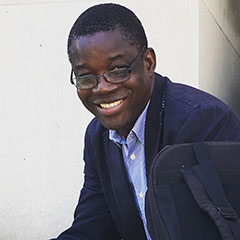
Working for the Marginalized
When Dougnon reached out to organizations for data on these migratory communities, those institutions weren’t just willing to pitch in—they were eager.
Little information is available on the long-term effects of these droughts on mass migration, and researchers like Dougnon are working to fill a crucial gap that will hopefully lead to actionable relief efforts. Mali has continued to deal with droughts, affecting about 400,000 residents each year and reducing crop revenues by $9.5 million annually.
“I’m so proud that not only are the migrants interested in my research, but also the institutions,” Dougnon said. “The state and NGOs are interested in these results because …these [migrants] are facing challenges.”
For Dougnon, this human aspect is the key that has driven his work throughout his long career.
“All of my research has this humanitarian aspect—defending the marginalized,” Dougnon said.
Dougnon, who is currently on leave from Fordham to work on the project, has been conducting this research for the first six months of the grant. He will spend the remainder of the year compiling a report on his findings that he will present to the foundation, as well as to a workshop of Fordham community members studying comparable issues.
How Do Communities Adapt?
At Fordham, Dougnan teaches a variety of undergraduate and master’s level courses that combine his expertise in French with subjects like African society and the environment. An anthropologist by trade, Dougnon has been surveying the humanitarian effects of climate change, such as how natural resources get depleted and how that impacts internal migration, for more than 25 years.
Dougnon stressed that these small-scale examples of the effects of climate change—and how agricultural communities respond to them in real time—could provide key insights into managing potentially larger resource scarcity.
“My project wants to look at how they have been able to adapt to new places in the south of Mali,” he said. “How do they transform this landscape by bringing in technologies, social organizations, and so on?”
Dougnon hopes to use his findings to create a new, more robust project that can replicate these methods on a larger scale—ideally encompassing multiple countries in Africa.
]]>Last summer, in response to a call from Pope Francis to “take concrete actions in the care of our common home,” Fordham published the Laudato Si’ Action Plan.
The document set forth an ambitious seven-year plan for the University that touches on everything from facilities and curriculum to student involvement, all with the ultimate goal of combating climate change.
Just this month, Fordham received a $50 million grant from the Environmental Protection Agency that the University will use to team up with community partners to address the issue.
Below are a few of the sustainability-related efforts, developments, and accomplishments that took place in the final quarter of 2023. Look for more updates in 2024!
Facilities
Going Hybrid
On Oct. 23, three hybrid minivans, including a wheelchair-accessible minivan, joined the fleet of Fordham’s Ram Vans. They replace gas-powered minivans previously used for wheelchair-accessible requests, trips to the Calder Center, and charter trip services. The vans use less gas, produce less CO₂, and can run up to 560 miles on one tank of gas.
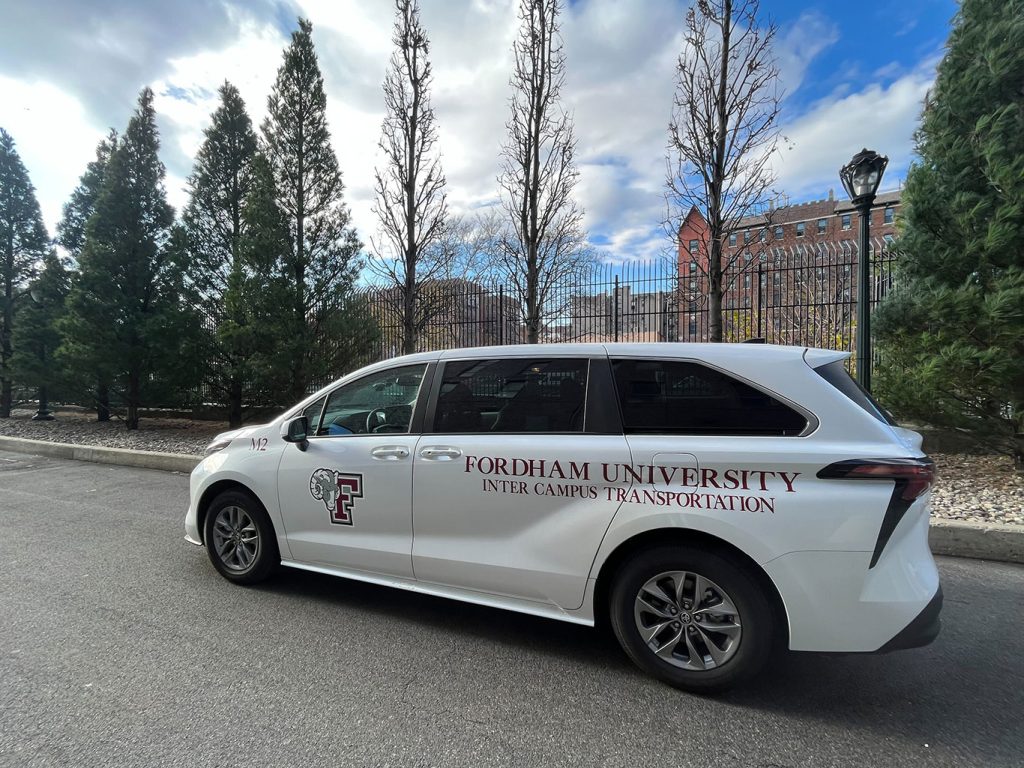
Dining
Micro Farms
This fall, Aramark installed vertical hydroponic units called Babylon Micro Farms at dining halls on the Lincoln Center and Rose Hill campuses. They grow fresh greens and herbs in a water-based solution (instead of soil, which requires frequent watering.) The greens are harvested for use in dining hall dishes and special student events.
Compared to traditional methods, each micro farm uses 96% less water, zero pesticides, 65% less fertilizer, and zero miles to transport. As a result, between January and June 2023, using them allowed Fordham to save 19,247 gallons of water, prevent 2.5 pounds of nitrogen from entering waterways, and reduce 32 pounds of food waste.
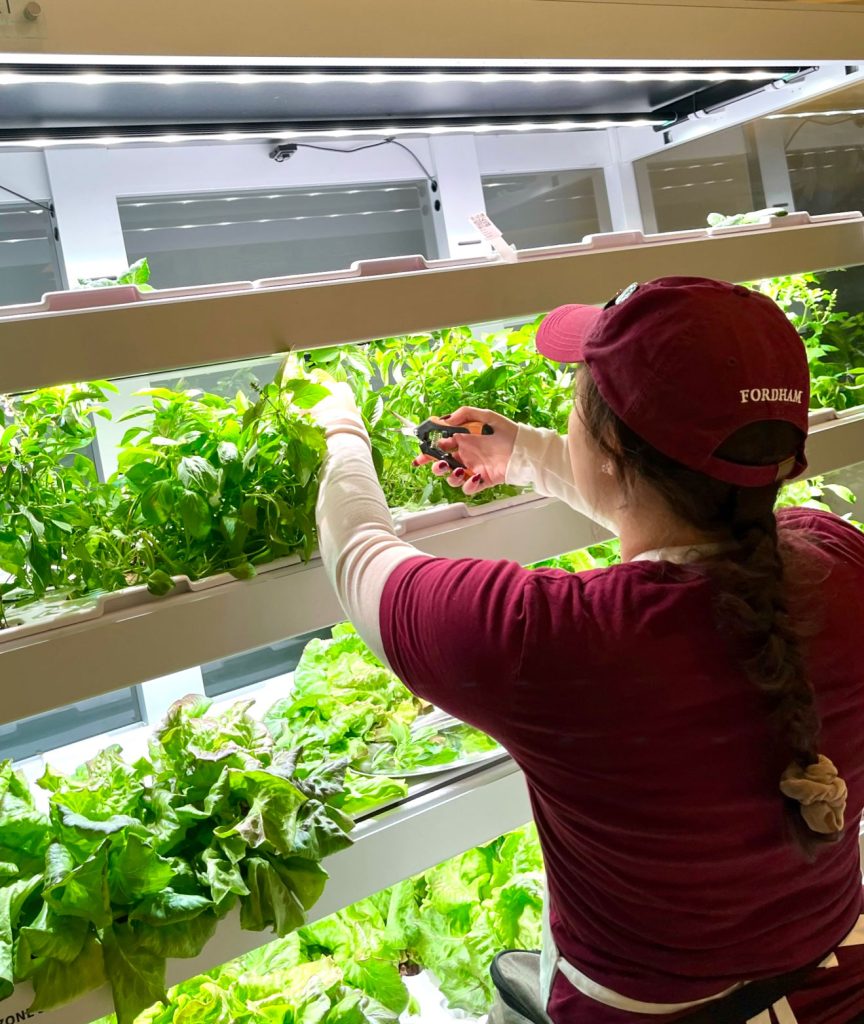
Academics
In the Classroom
Six undergraduate community-engaged learning classes offered in the Fall 2023 semester featured elements promoting sustainability: Anthropology of Food (Anthropology), Economics and Ecology of Food Systems (Economics), Thinking Visually (Visual Arts), Human Physiology (Biology), Consumer Behavior (Gabelli School of Business), and Leadership Integrated Project (Gabelli School of Business). At Fordham Law School, environmental law courses offered this semester included Environmental Law and Energy Law.
Fordham Law students wrote blog posts for the school’s Environmental Law Review on the Flint and Jackson water crises, NYC Local Law 97, the environmental damage caused by the fashion industry, and cell-cultivated meats.
Reading Laudato Si’
The Curran Center for American Catholic Studies held three seminars on Zoom this semester dedicated to reading Pope Francis’ encyclical Laudato Si’ and the 2023 follow-up, Laudate Deum. Visit the center’s website for more information on future seminars.
A Systems Approach
This semester, the Social Innovation Collaboratory and Career Center hosted a collaborative workshop on systems thinking, focused mainly on sustainability. The workshops, which were open to all undergraduate students, allowed them to explore the practice and application of systems thinking, which is rooted in a holistic approach to society’s more complex issues. The process is attractive to companies since it’s rooted in the idea of looking at complex problems with a new perspective. Contact Sadibou Sylla at the Collaborary for information on future workshops.
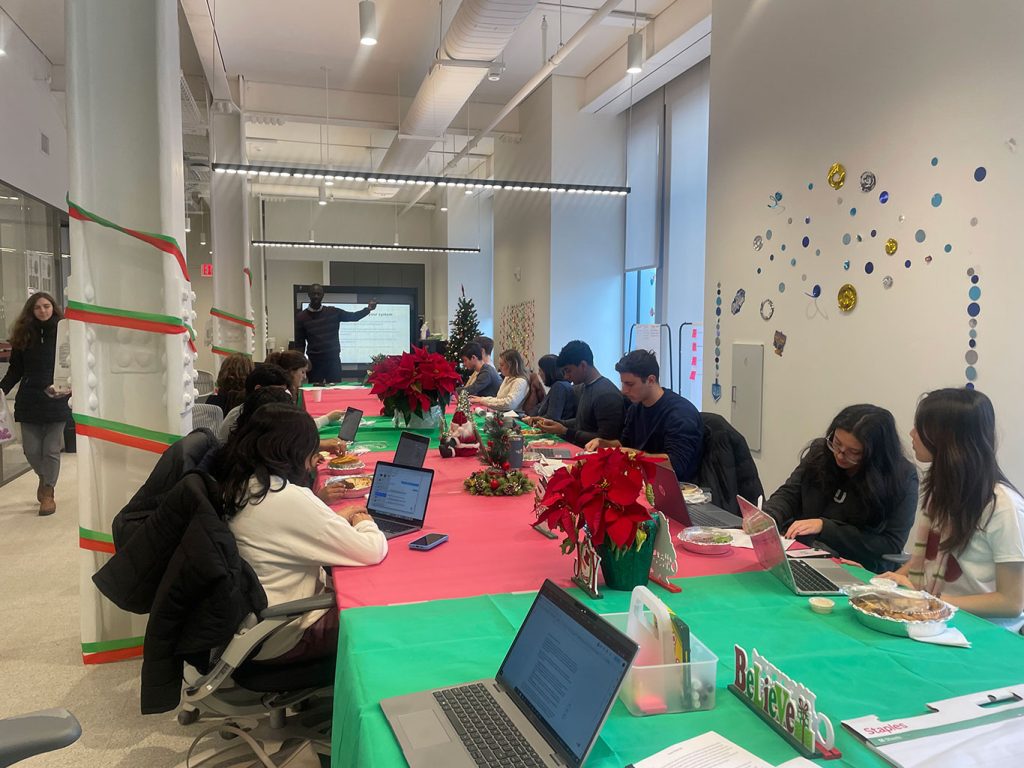
Students Take the Lead
Green Week: United Student Government sponsored Fordham College at Rose Hill’s Sustainability Week in November. It featured the Fordham Flea Pop-Up as well as a seminar on composting basics.
The Lincoln Center Environmental Club held a clean makeup tabling event on Nov. 30 to showcase the benefits of cruelty-free and clean makeup.
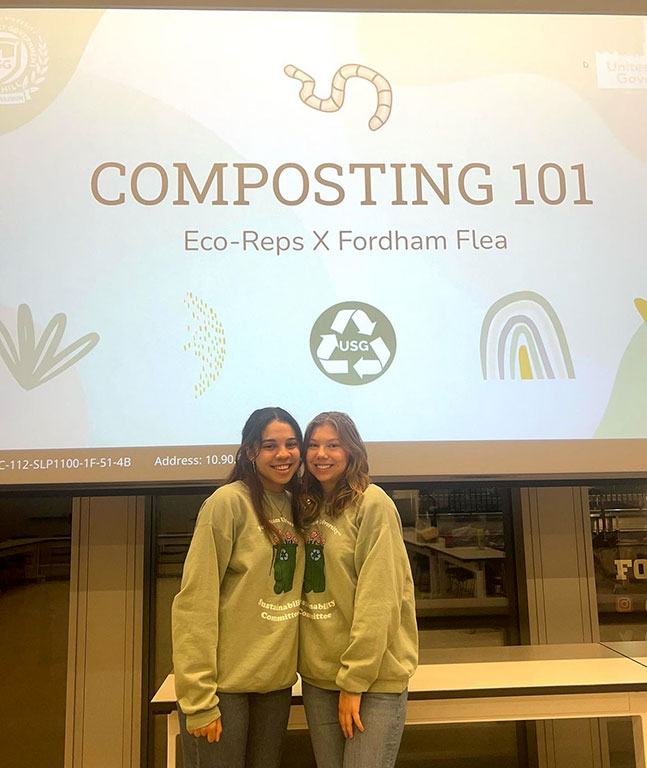
Community Engagement
As part of the Reimagine the Cross Bronx campaign, Fordham staff conducted weekend “walkshops” in the neighborhoods surrounding the highway. Funding came from a $25,000 grant from the New York City Department (DOT) that the Center for Community Engaged Learning received in October.
Fordham staff and students also held special Halloween and Thanksgiving-themed events at the Highbridge Farmers Market and community space, which was recently expanded thanks to an AARP grant.
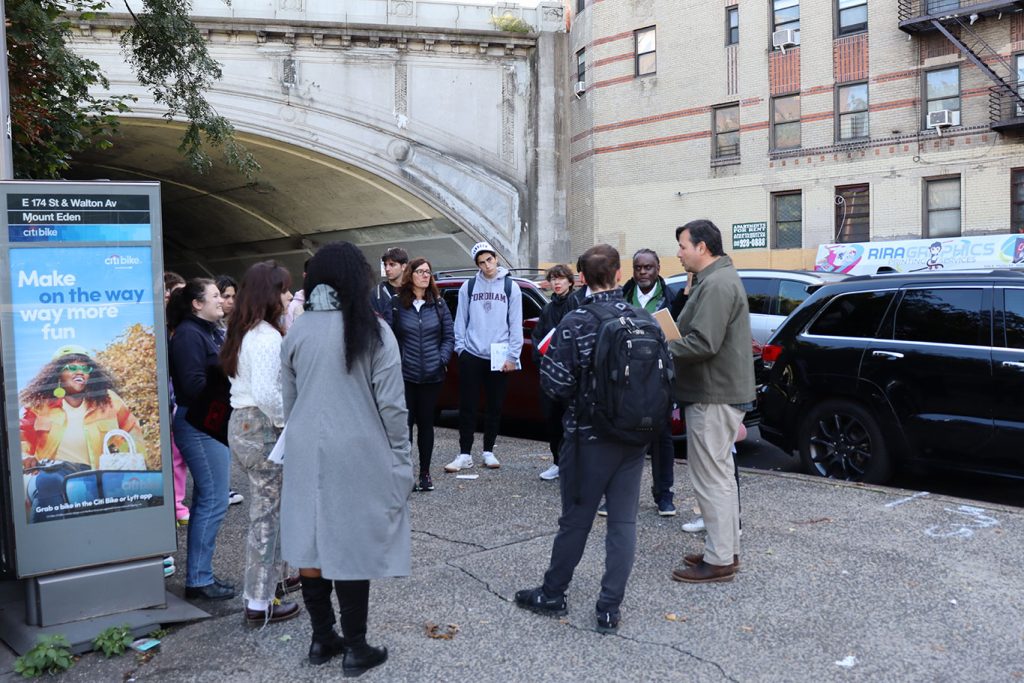
Faculty News
Marc Conte, Ph.D., professor of economics, published “Unequal Climate Impacts on Global Values of Natural Capital” in the journal Nature.
Stephen Holler, Ph.D., associate professor of physics, published “Education for Environmental Justice: The Fordham Regional Environmental Sensor for Healthy Air,” in the journal Social Sciences.
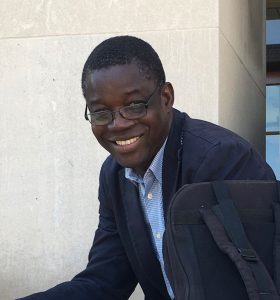
David Gibson, director of the Center for Religion and Culture (CRC), received $84,840 from the Porticus Foundation for the annual conference The Way Forward: Laudato Si’, Protecting Our Common Home, Building Our Common Church. The conference will take place in February at the University of San Diego.
Isaie Dougnon, Ph.D., associate professor of French and Francophone Studies and International Humanitarian Affairs, received $24,790 from the Wenner-Gren Foundation for research based on a local perspective on water and migration in West Africa.
Alumni
Giselle Schmitz, GSAS ’22, spent this fall working with the Coral Triangle Center in Bali, Indonesia—a nonprofit that connects governments, corporations, and local groups to help strengthen marine resources in the region.
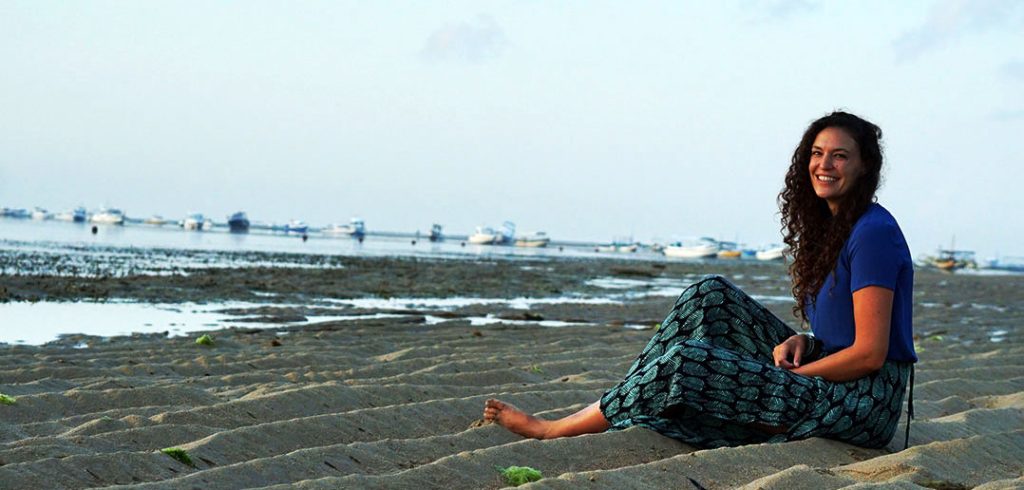
In Case You Missed It
It was a busy fall in terms of sustainability efforts! Here are some stories Fordham News covered that you may have missed: In October, the annual Fordham Women’s Summit focused on sustainability. In our theology department, a lecture for first-year students featuring Union Theological Seminary professor John J. Thatamanil connected religious supremacy to the destruction of the natural world. Four students have joined the Office of Facilities Management’s newly created internship program, while alumni are helping protect New York City’s birds and helping farmers adapt to climate change. The Gabelli School of Business hosted two Nobel Laureates at a conference on ESG. At the Law School, more than 20 students gathered in Central Park for a clean-up event for the annual Public Service Day, while alumna Melinda Baglio was honored for being a changemaker in the clean energy field.
Upcoming Events
Faculty Happy Hour: Sustainability and Environmental Justice
Open to all faculty interested in sharing ideas about sustainability.
Thursday, Jan. 18, 2024. RSVP: Julie Gafney, [email protected]
STEM Career Fair, Thursday, Feb. 15, Great Hall, Rose Hill Campus. Visit the Fordham Career Center next month for details.
Women of Color in STEM Career Panel, Wednesday, Feb. 28, Virtual. Visit the Fordham Career Center next month for details.
Social Impact and Non-Profit Micro-Fair, Thursday, March 14, 12th Floor Lounge, Lowenstein Center, Lincoln Center campus. Visit the Fordham Career Center next month for details.
Save the Date:
Climate Action Summit with President Tetlow: April 8, Rose Hill Campus
We’d Love to Hear From You!
Do you have a sustainability-related event, development, or news item you’d like to share? Contact Patrick Verel at [email protected].
]]>“Our students are curious and service-oriented, and at Fordham, they think deeply about justice and their place in the world,” said Lorna Ronald, Ph.D., director of Fordham’s Office of Prestigious Fellowships, adding that Fordham students are awarded Fulbrights every year. “We are excited to see our 10 Fulbright students continue to grow into global leaders through this transformative experience.”
From Long Island to Côte d’Ivoire
Schneider, a senior at Fordham College at Lincoln Center who earned his bachelor’s degrees in international studies and French and Francophone studies last February, was awarded an English teaching assistantship to Côte d’Ivoire. Schneider grew up in a predominantly white community on Long Island and said he’s enjoyed getting to know people from different backgrounds at Fordham. In his junior year, he took a Center for Community Engaged Learning course that sparked his interest in French-speaking countries in Africa.
“Through the Francophone Communities in New York City class, taught by professor Isaie Dougnon who is from Mali and was a Fulbright Scholar, I explored different West African immigrant neighborhoods, including those with people from Côte d’Ivoire. That’s where I learned about and became interested in Francophone Africa,” Schneider said. “After reading books in multiple French classes about Abidjan, the economic capital of Côte d’Ivoire, I also learned that it’s a really cool cultural center.”
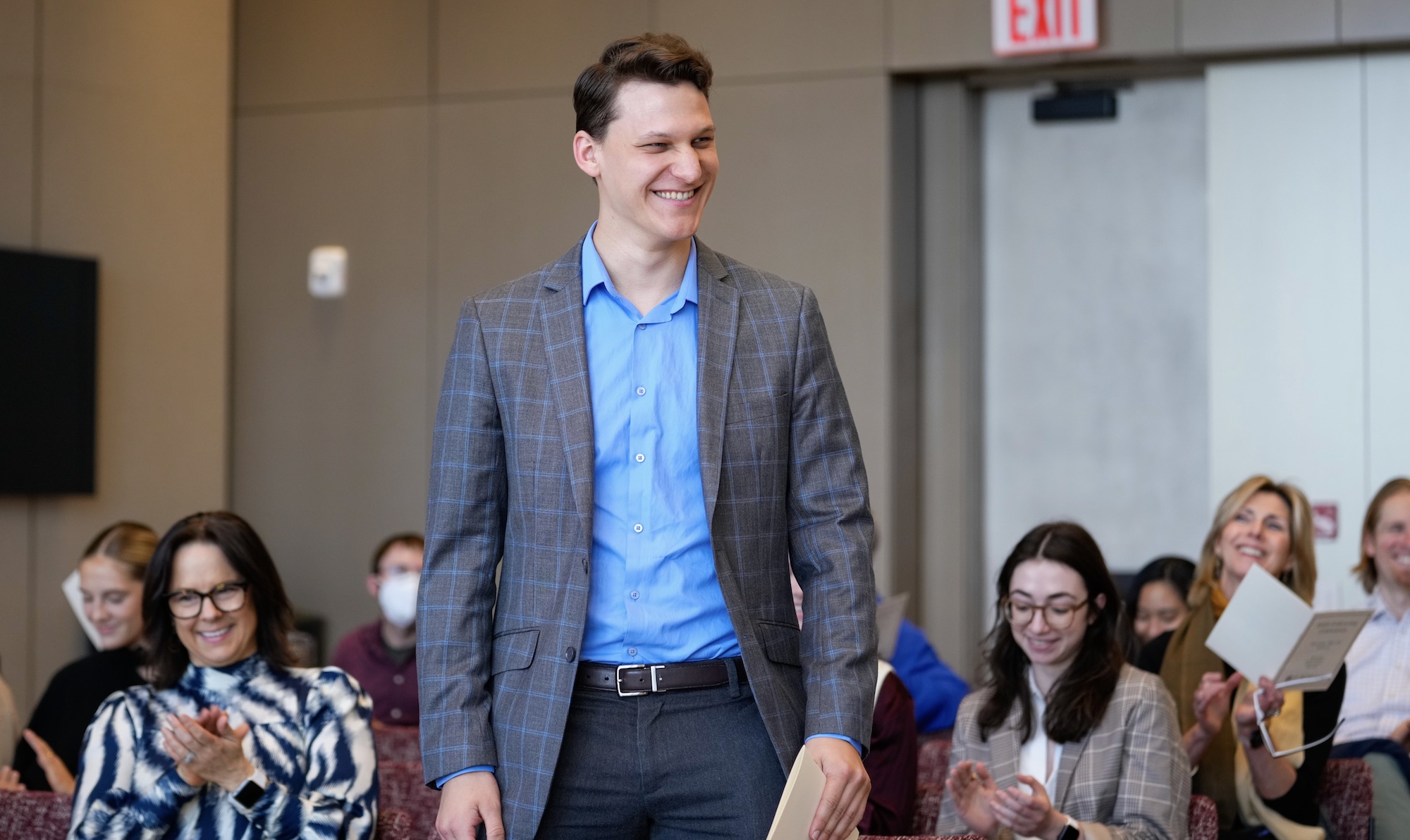
Throughout his four years at Fordham, Schneider also worked with children and teenagers at the nearby Lincoln Square Community Center, where he tutored students in English and mathematics through a work-study position with the America Reads and Counts Challenge program. He currently serves as a program director at the center.
This fall, he will work at a school or neighborhood center in Côte d’Ivoire, where he will teach English for nine months.
“I’m looking forward to teaching, exploring a different culture, and engaging with a demographic of people who aren’t like me but share common interests,” said Schneider, who plans to eventually attend graduate school and become a U.S. diplomat working with West African nations.
An Ohio Native with Teaching Experience in Kenya and Granada
Thurston, a senior in Fordham College at Rose Hill’s honors program who will be graduating this May with her bachelor’s degree in Spanish language and literature and minors in chemistry and biological sciences, was awarded an English teaching assistantship to Spain.
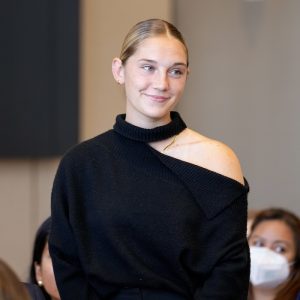
Thurston was born and raised in Ohio. During high school and college, she taught English to elementary school students in Kenya, immigrants in Granada, and Fordham undergraduates at home. “It’s wonderful to see the progress that I’m able to make with all of my students and to feel like I’m making a difference in their lives,” Thurston said.
While studying abroad in Granada as a Fordham student, she fell in love with Spain, its language, and the country’s “laid-back and community-oriented culture.” Through Fulbright, she found the perfect opportunity to return.
During the upcoming school year, she will teach English to elementary school students in the Canary Islands in Spain, where she will also practice her Spanish. After she completes her Fulbright, she plans to attend medical school and pursue a career as a bilingual obstetrician and gynecologist who works in Spanish-speaking communities.
“It’s one of the more interesting fields of medicine and generally a positive one. It’s also a field where the margins of care between white people and people of color, especially Black and Spanish-speaking patients, is really large, and I want to help to close that gap,” Thurston said.

]]>In addition to Schneider and Thurston, eight other students and alumni were awarded Fulbrights:
- Briana Boland, FCLC ’19, who is originally from Colorado and earned her bachelor’s degree in international studies, was awarded the Taiwan National Chengchi University Award in Asia-Pacific Studies.
- Molly Gleason, FCRH ’21, who is originally from Rhode Island and earned her bachelor’s degree in environmental science, was awarded an English teaching assistantship to Indonesia.
- Rachel Irish, FCRH ’22, who is originally from New York and earned her bachelor’s degree in psychology, was awarded an English teaching assistantship to South Korea.
- Megan Johnson, FCLC ’20, GSE ’21, who is originally from California and earned her bachelor’s degrees in humanitarian studies and Spanish studies and her master’s degree in bilingual childhood education, was awarded an English teaching assistantship to Ecuador.
- Anastasia McGrath, FCRH ’21, who is originally from New York and earned her bachelor’s degrees in international political economy and Chinese studies, was awarded an English teaching assistantship to Taiwan.
- Grace Powers, FCRH ’23, who is originally from Kentucky and will be graduating with degrees in sociology and history, was awarded an English teaching assistantship to Estonia.
- Madalyn Stewart, FCLC ’22, who is originally from Oregon and earned her bachelor’s degrees in political science and French and Francophone studies, was awarded a study/research award to France.
- Miguel Sutedjo, FCRH ’23, who is originally from New Jersey and will graduate with his bachelor’s degrees in international political economy and music, was awarded an English teaching assistantship to Taiwan.
Four students and alumni were also named Fulbright alternates:
- Dené Chung, FCLC ’21, who is originally from New Jersey and earned her bachelor’s degree in political science, was named an alternate for an English teaching assistantship to South Korea. (*Chung was selected for a Fulbright scholarship and is currently teaching English in South Korea.)
- Jillian Elba, FCRH ’23, who is originally from Massachusetts and will be graduating with her bachelor’s degrees in sociology and English, was named an alternate for an English teaching assistantship to Thailand.
- Emma Jane Konkoly, FCLC ’23, who is originally from Massachusetts and will be graduating with her bachelor’s degree in international studies, was named an alternate for an English teaching assistantship to Estonia.
- Alyssa Peralta, FCLC ’23, who is originally from Illinois and will be graduating with her bachelor’s degree in economics, was named an alternate for an English teaching assistantship to Mexico.